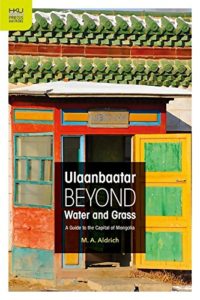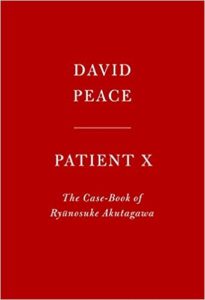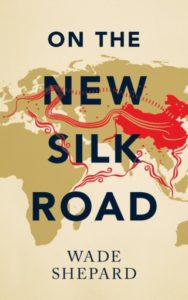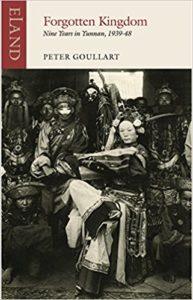Coming in 2018…4 Asia Books to Read in 2018
Posted: December 21st, 2017 | 1 Comment »Fear not – I’m not going to plug my own City of Devils: A Shanghai Noir (out March in Asia, May in Oz/NZ, June in the US and July in the UK) – but here’s some other Asia themed books I’ve had a chance to read early and think worth noting now for those who like to pre-order….
 Ulaanbaatar beyond Water and Grass – Michael Aldrich – is the first book in the English language that takes the visitors to an in-depth exploration of the capital of Mongolia. In the first section of the book, M. A. Aldrich paints a detailed portrait of the history, religion, and architecture of Ulaanbaatar with reference to how the city evolved from a monastic settlement to a communist-inspired capital and finally to a major city of free-wheeling capitalism and Tammany Hall politics. The second section of the book offers the reader a tour of different sites within the city and beyond, bringing back to life the human dramas that have played themselves out on the stage of Ulaanbaatar. Where most guide books often lightly discuss the capital, Ulaanbaatar beyond Water and Grass: A Guide to the Capital of Mongolia reveals much that remains hidden from the temporary visitor and even from the long-term resident. Writing in a quirky, idiosyncratic style, the author shares his appreciation and delight in this unique urban setting—indeed, in all things Mongolian. The book finally does justice to one of the most neglected cultural capitals in Asia.
Ulaanbaatar beyond Water and Grass – Michael Aldrich – is the first book in the English language that takes the visitors to an in-depth exploration of the capital of Mongolia. In the first section of the book, M. A. Aldrich paints a detailed portrait of the history, religion, and architecture of Ulaanbaatar with reference to how the city evolved from a monastic settlement to a communist-inspired capital and finally to a major city of free-wheeling capitalism and Tammany Hall politics. The second section of the book offers the reader a tour of different sites within the city and beyond, bringing back to life the human dramas that have played themselves out on the stage of Ulaanbaatar. Where most guide books often lightly discuss the capital, Ulaanbaatar beyond Water and Grass: A Guide to the Capital of Mongolia reveals much that remains hidden from the temporary visitor and even from the long-term resident. Writing in a quirky, idiosyncratic style, the author shares his appreciation and delight in this unique urban setting—indeed, in all things Mongolian. The book finally does justice to one of the most neglected cultural capitals in Asia.
 Patient X – David Peace – The acclaimed author of Occupied City, Tokyo Year Zero, and the Red Riding Quartet now gives us a stunning work of fiction in twelve connected tales that take up the strange, brief life of the brilliant twentieth-century Japanese writer, Ryunosuke Akutagawa. Haunting and evocative, brutal and surreal, these twelve connected tales evoke the life of the Japanese writer RyÅ«nosuke Akutagawa (1892-1927) whose short story, “In the Grove” served as an inspiration for Kurosawa’s famous film RashÅmon; and whose narrative use of multiple perspectives and different versions of a single event influenced generations of storytellers. Writing out of his own obsession with Akutagawa, David Peace delves into the known facts and events of the writer’s life and inner world–birth to a mother who was mentally ill and a father who died shortly thereafter; his own battles with mental illness; his complicated reaction to the beginnings of modernization and Westernization of Japan; his short but prolific writing career; his suicide at the age of 35–and creates a stunningly atmospheric and deeply moving fiction that tells its own story of a singularly brilliant mind.
Patient X – David Peace – The acclaimed author of Occupied City, Tokyo Year Zero, and the Red Riding Quartet now gives us a stunning work of fiction in twelve connected tales that take up the strange, brief life of the brilliant twentieth-century Japanese writer, Ryunosuke Akutagawa. Haunting and evocative, brutal and surreal, these twelve connected tales evoke the life of the Japanese writer RyÅ«nosuke Akutagawa (1892-1927) whose short story, “In the Grove” served as an inspiration for Kurosawa’s famous film RashÅmon; and whose narrative use of multiple perspectives and different versions of a single event influenced generations of storytellers. Writing out of his own obsession with Akutagawa, David Peace delves into the known facts and events of the writer’s life and inner world–birth to a mother who was mentally ill and a father who died shortly thereafter; his own battles with mental illness; his complicated reaction to the beginnings of modernization and Westernization of Japan; his short but prolific writing career; his suicide at the age of 35–and creates a stunningly atmospheric and deeply moving fiction that tells its own story of a singularly brilliant mind.
 On the New Silk Road – Journeying Through China’s Artery of Power – Wade Shepherd – The Silk Road once served as the vital artery of the ancient world, connecting China to societies across Eurasia and providing immense wealth and prestige. Now, with China once again in the ascendant, it is attempting to restore its place at the centre of global trade, through one of the most ambitious projects of modern times. This ‘New Silk Road’ will use rail lines, highways, pipelines and shipping routes across China, Russia, the Middle East and Central Asia, unifying a region that has been contested for millennia. Having travelled the length and breadth of the future ‘Road’, from its planned starting point in Xi’an, China to its outer reaches in Western Europe, Wade Shepard provides an absorbing account of China’s efforts to make the New Silk Road a reality, and its implications for the world as a whole. Shepard argues that the Road represents the focal point of China’s plans for an alternative economic order which it hopes will rival or even surpass that of the West. On the New Silk Road is the essential account of a crucial turning point in the history of Asia, and of the world.
On the New Silk Road – Journeying Through China’s Artery of Power – Wade Shepherd – The Silk Road once served as the vital artery of the ancient world, connecting China to societies across Eurasia and providing immense wealth and prestige. Now, with China once again in the ascendant, it is attempting to restore its place at the centre of global trade, through one of the most ambitious projects of modern times. This ‘New Silk Road’ will use rail lines, highways, pipelines and shipping routes across China, Russia, the Middle East and Central Asia, unifying a region that has been contested for millennia. Having travelled the length and breadth of the future ‘Road’, from its planned starting point in Xi’an, China to its outer reaches in Western Europe, Wade Shepard provides an absorbing account of China’s efforts to make the New Silk Road a reality, and its implications for the world as a whole. Shepard argues that the Road represents the focal point of China’s plans for an alternative economic order which it hopes will rival or even surpass that of the West. On the New Silk Road is the essential account of a crucial turning point in the history of Asia, and of the world.
 Forgotten Kingdom: Nine Years in Yunnan – Peter Goullart – as reissue of Goullart’s classic tale of how he spent nine years in the all-but-forgotten Nakhi Kingdom of south west China. He had a job entirely suited to his inquiring, gossipy temperament: to get to know the local traders, merchants, inn-keepers and artisans to decide which to back with a loan from the cooperative movement. A Russian by birth, due to his extraordinary skill in language and dialects, Goullart made himself totally at home in Likiang, which had been ruled by Mandarin officials descended from ancient dynasties, and was visited by caravans of Tibetan and Burmese travelling merchants, and such mysterious local highland peoples as the Lobos. In his company we get to hear about the love affairs and social rivalries of his neighbours, to attend magnificent banquets, meet ancient dowagers and handsome warriors as well as to catch the sound of the swiftly running mountain streams, the coarse ribaldry of the market ladies and the happy laughter emerging from the wine shops. Through him we are able to travel back to this complex society, which believed simultaneously and sincerely in Buddhism, Taoism and Confucianism, in addition to their ancient Animism and Shamanism.
Forgotten Kingdom: Nine Years in Yunnan – Peter Goullart – as reissue of Goullart’s classic tale of how he spent nine years in the all-but-forgotten Nakhi Kingdom of south west China. He had a job entirely suited to his inquiring, gossipy temperament: to get to know the local traders, merchants, inn-keepers and artisans to decide which to back with a loan from the cooperative movement. A Russian by birth, due to his extraordinary skill in language and dialects, Goullart made himself totally at home in Likiang, which had been ruled by Mandarin officials descended from ancient dynasties, and was visited by caravans of Tibetan and Burmese travelling merchants, and such mysterious local highland peoples as the Lobos. In his company we get to hear about the love affairs and social rivalries of his neighbours, to attend magnificent banquets, meet ancient dowagers and handsome warriors as well as to catch the sound of the swiftly running mountain streams, the coarse ribaldry of the market ladies and the happy laughter emerging from the wine shops. Through him we are able to travel back to this complex society, which believed simultaneously and sincerely in Buddhism, Taoism and Confucianism, in addition to their ancient Animism and Shamanism.
I am wondering when Wade Shepard’s book : On the New Silk Road will finally be published. The Asian Arguments books series by ZED Books has moved to Bloomsbury. You are still listed there as co-editor. Do you have any idea if and when the book will still be published? I would be very happy to.
Thanks a lot.
Best.